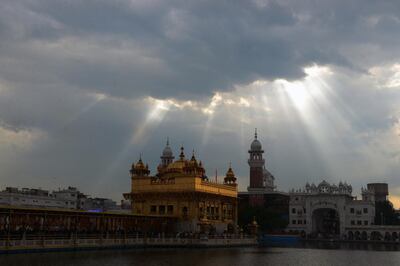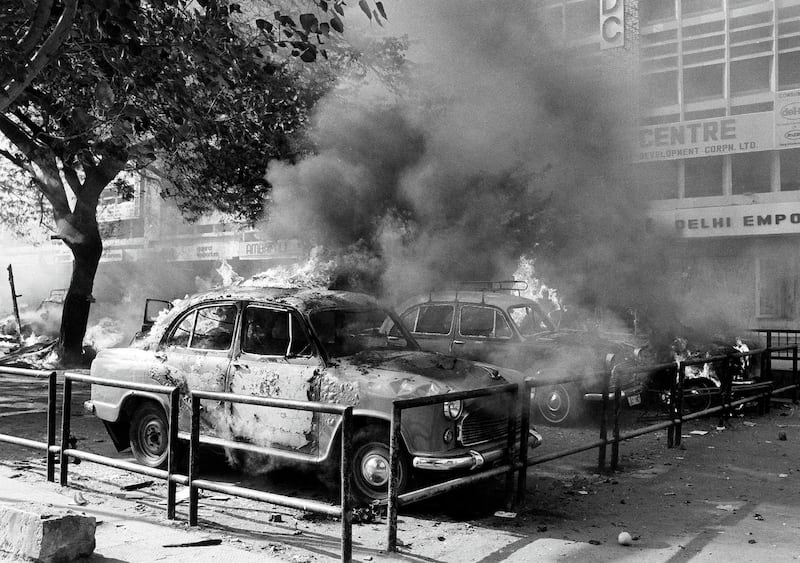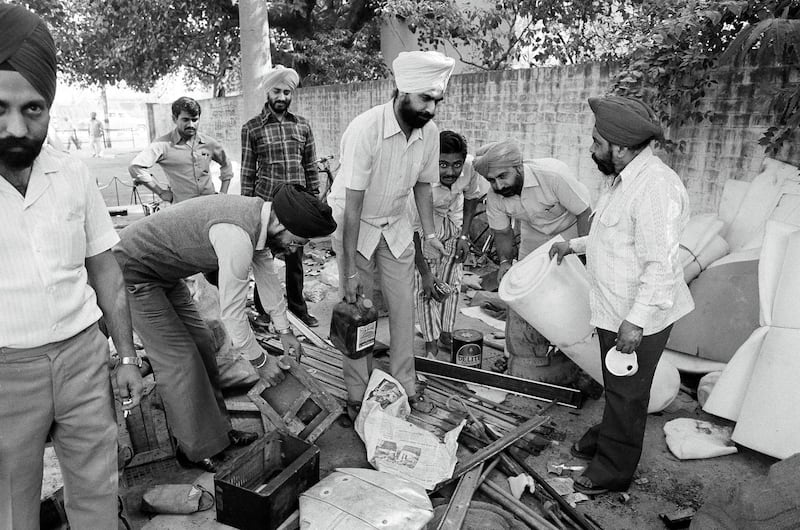The sentencing this week in India of a former politician who incited bloody riots in 1984 has raked up painful memories for the Sikh community in the UAE.
A Delhi High court ruling on Monday has been described as the most significant conviction to date in relation to riots that swept India following the killing of then-Prime Minister Indira Gandhi by her Sikh bodyguards.
Judges found Sajjan Kumar, then a member of parliament of India’s Congress party, guilty of inciting crowds to kill a Sikh family during the riots and sentenced him to life in prison. The court also awarded jail terms to five others.
UAE Sikhs said they hoped others would be brought before the law for the deaths of more than 3,000 members of their community in New Delhi, India’s capital, thirty-four years ago.
The verdict took Dubai resident Davinder Singh back to the darkest days of his life when his father was beaten by a mob and his family fled India.
Mr Singh said his family rarely talk about the trauma they suffered in the horrific attacks that wracked the nation when he was just 3.
His father suffered internal injuries and the family abandoned their home and motor vehicle shop to live with relatives in neighbouring states for years before they returned to the capital in the 1990s.
_______________
Read more:
Indian politician Sajjan Kumar gets life over 1984 anti-Sikh riots
From Sikh to Christian, religious leaders gear up for UAE's Year of Tolerance
[ Flydubai to launch new flights to India's Kozhikode ]
_______________
“My father was left for dead. He was unconscious when my aunt and mother dragged him to safety inside our home. My family was so scared after that, and my father was never the same.
"I had to piece together stories from my aunt and mother because nobody wanted to talk about that time of suffering later,” said the 34-year-old, who works for an energy company.
“Things were never the same for most families after that. Many are still in bad shape because children lost their fathers and families were displaced when the only earner was killed. I’m happy that the decision finally came but this is only one piece of it. There are others responsible for killing more people in other parts of India.”
Prime minister Gandhi was killed on October 31, 1984, by bodyguards in revenge for her decision earlier that year to send the army into the holiest Sikh shrine, the Golden Temple, where militants who were part of a Sikh insurgency had taken refuge.
The killing of Gandhi, a leader of the Congress that is now India’s main opposition party, sparked countrywide attacks on the Sikh community. The worst crimes took place in New Delhi where mobs hacked and burnt Sikhs to death.
A few other officials have been imprisoned for the 1984 violence with victims and families complaining that adequate steps have not been taken to bring political leaders to justice. India’s justice system moves slowly and cases routinely take decades to resolve.
“My only wish and hope is that such genocide should not happen in any part of the world. You cannot blame a whole community for what a few people did. People should remember humanity and family and things should never reach this level,” Mr Singh said.
The 50,000 strong UAE Sikh community welcomed the decision, but termed it ‘delayed justice’.
Banker Amanjeet Singh hoped the judgment would send a clear message that nobody was above the law.
“There is a need to continue to catch others who were guilty and did not do their duty to protect the innocent,” he said.

When working in Delhi, Mr Amanjeet met several victims.
“Some boys were 10 or 12 when it happened, but they can never forget. How can somebody forget when he has seen his father or neighbour die in front of him? This judgment was needed to restore faith in the system and win back the loyalty of the community,” he said.
Businessman Surender Kandhari, founder of the Sikh gurdwara in Dubai, said it was a “historical” decision that people had been awaiting for decades.
“It was sad to see our community tortured in Delhi and to hear the inhumanity they suffered. People talked about it in low tones but now it’s very important to speak up about how justice has finally been served,” he said.
“The entire Sikh community of the UAE is overwhelmed by the judgment passed by the Delhi High court. Our community is truly grateful. We hope the guilty verdict is a lesson to people who take the law into their own hands.”
There are other cases against Mr Kumar, the former Congress politician, relating to the riots. Monday’s verdict was in relation to the killing of a family of five in Delhi.
He was ordered by the court to surrender by December 31 to begin serving his sentence.
Kumar’s lawyers challenged his conviction and life sentence in India’s Supreme Court on Saturday.







